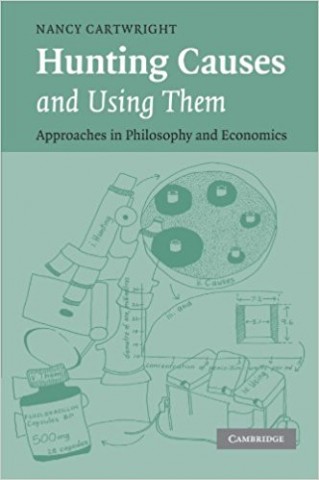We frequently read and use claims based on claims of causation. Yet, infrequently do we explore if the claims are well founded, or if the methods are well suited to the claims being made. Nancy Cartwright's "Hunting Causes and Using Them: Approaches in Philosophy and Economics" (2007) is a valuable resource to better engage with causation. The book, a collection of essays, "is for philosophers, economists and social scientists or for anyone who wants to understand what causality is, how to find out about it and what it is good for" (p. 1). Cartwright argues: "Our philosophical treatment of causation must make clear why the methods we use for testing causal claims provide good warrant for the uses to which we put those claims" (p. 2).
The chapters cover a range of different topics and approaches to causation, however in general the book provides arguments for caution:
- "What causes should be expected to do and how they do it - really, what causes are - can vary from one kind of system of causal relations to another and from case to case. Correlatively, so too will the methods for finding them... The important thing is that there is no single interesting characterizing feature of causation; hence no off-the-shelf or one-size-fits-all method for finding out about it, no 'gold standard' for judging causal relations" (p. 2).
- "Just as there is an untold variety of quantities that can be involved in laws, so too there is an untold variety of causal relations. Nature is rife with very specific causal relations involving these causal relations, laws that we represent most immediately using content-rich causal verbs: the pistons compress the air in the carbine chamber, the sun attracts the planets, the loss of skills among long-term unemployed workers discourages firms from opening new jobs... These are genuine facts, but more concrete than those reported in claims that use only the abstract vocabulary of 'cause' and 'prevent'. If we overlook this, we will lose a vast amount of information that we otherwise possess, important, useful information that can help us with crucial questions of design and control" (p. 19-20).
- "There may be good evidence for the effectiveness of a policy conceived, as it usually is, in the abstract, but the actual outcomes may depend crucially on the find tuning of the method of implementation... Or consider poverty measures. Policy may set whether a poverty line should be relative or absolute and if relative, in what way (for instance, two-thirds of the median income). But the results - for instance, the poverty ranking among European countries - depend crucially on dozens and dozens of details of implementation (how to deal with individuals versus families, wealth or welfare benefits versus earned income, etc.), details where it seems that very different decisions can be equally motivated by the ranking will come out very differently depending on how these decisions are taken. The more the details matter, the more the problems of evidence multiply." (p. 41).
- "I can summarize my view by comparing an economic model to a certain kind of ideal experiment in physics: criticizing economic models for using unrealistic assumptions is like criticizing Galileo's rolling ball experiments for using a plane honed to be as frictionless as possible. The defence of economic modelling has a bite, however. On the one hand, it makes clear why some kinds of unrealistic assumptions will do; but on the other, it highlights how totally misleading other kinds can be - and these other kinds of assumptions are ones that may be hard to avoid given the nature of contemporary economic theory." (p. 217)
Even if parts may be challenging for social scientists who are unfamiliar with economics and equations, the book is well worth reading.

